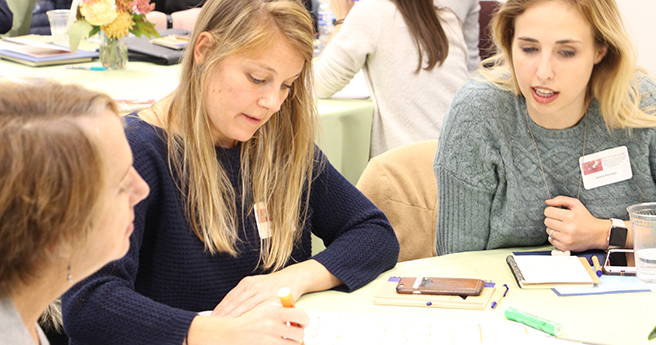
Photo by Matt Schorr
Clinicians and food bank representatives work together to better utilize resource to combat food insecurity and provide safety net health care.
NASHVILLE, Tenn. Safety net clinics and food banks, traditionally separate entities, both offer care and services to similar, vulnerable populations. Recently, however, the groups began working together to better connect resources focused on food insecurity with the health care safety net.
On November 17, 2017, community health centers, researchers, food bank representatives, government agencies and other non-profit organizations gathered at the Second Harvest Food Bank of Middle Tennessee to discuss how they might enhance the effectiveness of their services by working together.
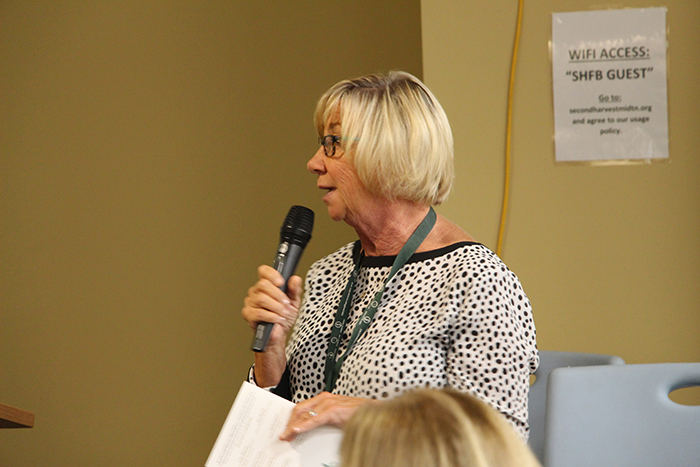
Photo by Matt Schorr
Jaynee Day, President and CEO of Second Harvest Food Bank of Middle Tennessee welcomes attendees to the Health & Hunger Summit.
‘Working together’
Jaynee Day, President and CEO of Second Harvest, described the event – the Health & Hunger Summit – as an opportunity to connect health care providers with food resources in the community. “We’re here to discuss how we can share information,” she said, “how we can work together collectively.”
Safety Net Consortium of Middle Tennessee (SNCMT) President Carol Westlake concurred. In her opening remarks, Westlake highlighted the need for the groups represented at the summit to work together in order to create a community with good health.
“It takes all of us working together on this,” she said.
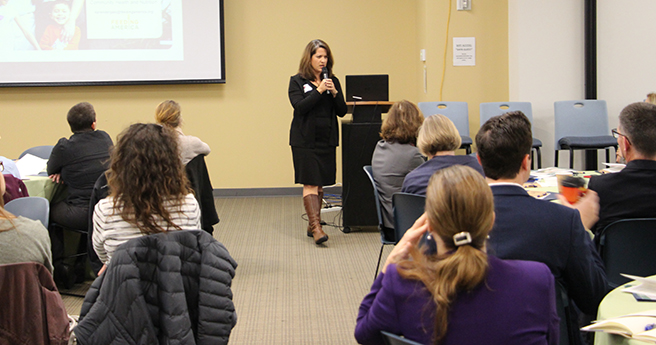
Photo by Matt Schorr
Community Health and Nutrition Consultant Kim Prendergast was the keynote speaker for the Health & Hunger Summit.
Keynote Speaker
Kim Prendergast, a Community Health and Nutrition Consultant from Feeding America, pointed out that America spends more on medical services rather than on what keeps people healthy.
“People who are food insecure are more likely to develop chronic disease,” she said. “We’re seeing lack of food in the house result in Emergency Room visits.”
However, she believed there was an opportunity for clinics and food banks to be part of the solution. Better access to food and diet quality can decrease the risk of diet-related disease and improve management of existing diseases.
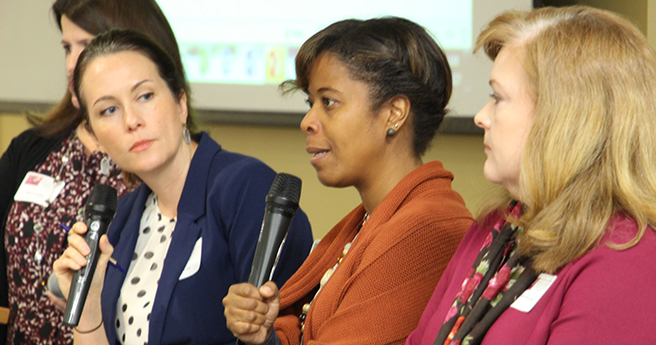
Photo by Matt Schorr
Matthew Walker Comprehensive Health Center CEO Katina Beard speaks during a panel discussion.
Panel Discussion
During a panel discussion, medical center representatives who screen for food insecurity and either have food pantries on site or refer patients to resources, outlined the ways better food access improves community health. Keri Howell, a Clinical Dietician from the Maury Regional Medical Center, said, “Sending patients home with food reduces readmission rates.”
Likewise, Katina Beard, CEO of Matthew Walker Comprehensive Health Center (MWCHC), said facilitating the process of patients accessing healthy food during their clinic visits creates a greater sense of support from their provider.
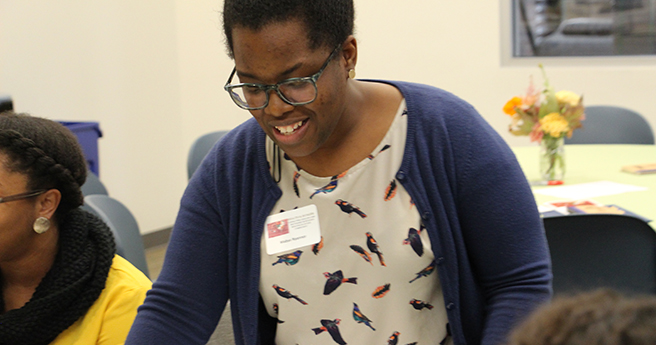
Photo by Matt Schorr
Mabya Nannor discusses ideas for future efforts with her group during the breakout session.
Breakout Session
As the summit closed, attendees broke into groups to discuss takeaways and suggestions moving forward.
One group said it was no longer enough to offer food, they need to teach about good, healthy food. Providers, patients and others need to be educated, they said.
Another group argued that increased access and awareness were crucial, as was continued collaboration between food banks and clinics.
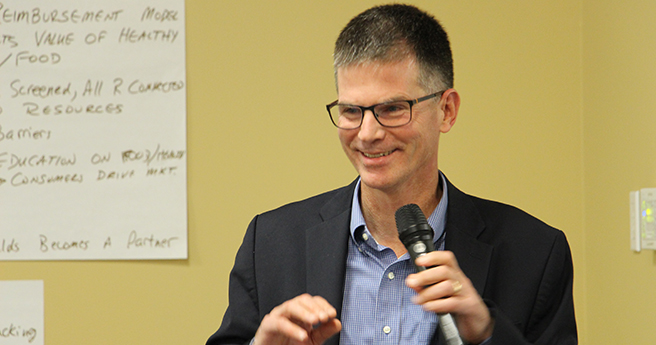
Photo by Matt Schorr
Nashville Metro Public Health Department Director of Health Bill Paul, MH, MPH offers closing remarks for the summit.
Call to Action
“Where there are concentrations of poor people, people are less healthy,” Nashville Metro Public Health Department Director of Health Bill Paul, MH, MPH, said in the summit’s closing remarks. “Our long-term vision is for healthcare and social care to work together.”
Partnerships, he explained, are key, because they can learn from each other. He believed it was important empower staff to start something and learn from it.
“In public health, we always have to be thinking upstream,” he said, “and addressing the cause of hunger should always be in our minds.”
About the Meharry-Vanderbilt Alliance
Founded in 1999, the Alliance bridges the institutions of Meharry Medical College and Vanderbilt University Medical Center. Its mission is to enrich learning and advance clinical research in three primary areas -- community engagement, interprofessional education and research -- by developing and supporting mutually beneficial partnerships between Meharry Medical College, Vanderbilt University Medical Center and the communities they serve. Through community engagement, the Alliance serves a large community of stakeholders including surrounding universities and colleges, community organizations, faith-based outlets and community health centers. Its interprofessional education enhances students' interdisciplinary understanding and improves patient outcomes through integrated care. The research conducted provides access to experienced grant writers and materials supporting the grant application process and facilitates grant-writing workshops.




